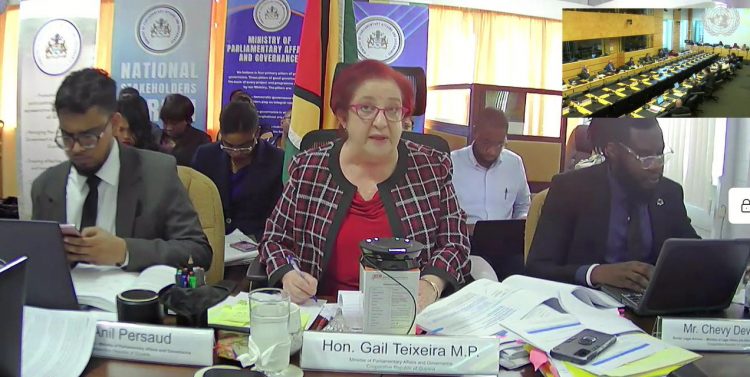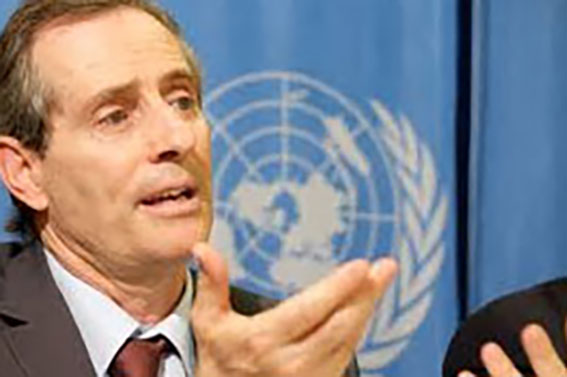When Guyana faced questions for its third and final day before the UN Human Rights Committee yesterday, Minister of Parliamentary Affairs and Governance Gail Teixeira, was pressed to provide answers on the independence of the judiciary and specifically the reason this country for well over a decade now, continues to be without a substantive Chancellor and Chief Justice.
Concerns of executive interference and control in the appointment process for judges were raised by Portuguese committee member José Manuel Santos Pais by whom the questions were asked; with him stating that such a state of affairs negatively affects the employment and other benefits of judges, including their security of tenure; even as he called for urgent constitutional reform in this area.
“It’s not enough just to say that you have independent agencies, if the persons that run these agencies are appointed by those that should not appoint them,” he said.

Teixeira among her responses during her virtual address before the United Nations’ 140th Session of the Human Rights Committee (CCPR) in Geneva, Switzerland, told the committee from her Georgetown office that the “proof” was in the proverbial “pudding,” when assessing Guyana’s judiciary which she said was independent.
On this point she sought to note that judges rule both in favour as well as against the government; advancing the position that irrespective of what constitutes the process of appointment, the real indicator of the judiciary’s independence is seen when one considers that the State also loses cases.
On the issue of the non-appointment of a substantive Chancellor and Chief Justice, she said that the impasse continues to be a lack of agreement between the President and Leader of the Opposition.
Nearly two years ago, Opposition Leader Aubrey Norton said he was prepared to agree to the immediate appointing of Justices Yonette Cummings-Edwards and Roxane George-Wiltshire as Chancellor and Chief Justice respectively. President Irfaan Ali never responded to that proposal neither did he make one of his own.
It was this very requirement for agreement by the President and Opposition Leader which Santos Pais expressed concern about, describing the process as being subject to political interference.
His launching pad was Guyana’s Constitution which he noted provides for the appointment of the Chancellor and the Chief by the President after obtaining the agreement of the Leader of the Opposition.
He noted that the Judicial Service Commission (JSC) which had not been constituted for six years until July of last year, is composed of the Chancellor and Chief Justice with other members also appointed by the President after meaningful consultation with the opposition leader.
The President he then went on to state, appoints judges and part-time judges with the advice of the JSC, while this body appoints other legal officers.
Asserted
It was against this backdrop, that Santos Pais asserted that both the executive and legislative arms of government “interfere with the appointment of judges;” while going on to state that “it has been the practise of several presidents not to confirm the substantive appointment of judges, but to keep them in an acting position.”
This practise he said, negatively affects the employment and other benefits of those judges as well as hampering their security of tenure.
“This seems to be currently the case for the head of the judiciary,” in Guyana he asserted; while going on to add, “the entire judiciary is therefore under some degree of influence and control by the executive President of Guyana and the Parliament.”
This he reasoned can lead to the politization of the judiciary and delaying the appointment of judges which leads to a significant backlog of cases in both criminal—especially at the pretrial stages—and civil courts.
“How is then, the independence of both judges and prosecutors ensured?” he enquired from Teixeira, asking also, “how many representatives of judges in the direction of public prosecution are there in the Judicial Service Commission.”
He then further pressed, “are there specific rules laid down in the law on the appointment of judges and prosecutors, their career, promotion, discipline and particularly removal?”
With the stalemate surrounding the current constitutional process the committee member sought to enquire from Teixeira whether there is any intention to create a self-governing body or bodies to deal with all aspects relating to the career of both judges and prosecutors and where such judicial officers would have the majority, thereby “avoiding any type of undue interference by other branches of government.”
Santos Pais also asked for the current gender representation of both judges and prosecutors and measures taken to secure equitable access to justice and strengthen the public confidence in the judiciary in the direction of public prosecution.
With the time limit given for responses, Teixeira had not initially addressed any of Santos Pais’ questions; which saw him insisting in the second round allowed for follow-up questions, that his enquiries needed answers.
He said his concern was that if the President appoints almost all judicial
officers, including members of the JSC, then “there is at least a suspicion of interference [by] both government and the Opposition Leader in the appointment and career of judges and public prosecutors.”
He said it needed to be ascertained whether there is any intention in the ongoing constitutional process in order to create self-governing bodies for both judges and prosecutors “in order for them to avoid any type of undue influence by other branches of government.”
Responding in the second round, Teixeira said that the JSC comprises the Chair of the Public Service Commission (PSC), the Chancellor of the Judiciary, the Chief Justice, one name submitted by Parliament for a legal person not active in the profession, and a retired lawyer or judge agreed on by both the President and opposition leader.
“That is the Judicial Service Commission, she asserted sating that “even if the President had sway and was able to convince the leader of the opposition to appoint a man he liked, the Commission itself has other persons on it” who may or may not support such a move.
She then clarified to the UN Committee that prosecutors are not appointed by the JSC but rather by the Director of Public Prosecutions (DPP) while stating that this office is also a constitutional one in its appointment.
She said that the JSC makes a recommendation to the President to appoint by sending a list to him “to appoint,” nothing that if the president has a concern with any of the names submitted, he has to put in writing as is constitutionally mandated, disclosing his concern with the particular judge.
She noted that thereafter, the JSC will review that concern and respond; noting that is the JSC says it does not accept the President’s objections, the Head of State then has no choice but to appoint.
Meanwhile, regarding appointments of the two top judicial positions, Teixeira commenced against a historical background, referencing the 1999/2001 constitutional reform process, stating that “politically, the two major political parties, following a lot of violence, efforts had been made to return to normalcy and to ensure the involvement of the opposition party in that process.
Pointing to examples in the Region, she said that what was built into the Constitution for those appointments to be made by the President after agreement with the Opposition Leader who she noted has a veto vote on the appointment by the President.
Formula
She said that this formula will have to be reviewed. Whether it makes sense she said, will be a decision for the Guyanese people.
Referencing Article 127 of the Constitution, however, she sought to note that the Chancellor and Chief Justice are to be appointed by agreement between the President and Opposition Leader.
She said that they have both been “unable to agree for some time, resulting in the current situation,” while going on to add that the previous Chancellor and Chief Justice served for years in acting positions, “to their detriment regarding their pensions and other benefits they would have been entitled to,” had they been fully appointed.
“It is not a recent occurrence” she went on, noting that the former Chancellor and Chief Justice after the amendment was made to the Constitution “suffered the same fate,” though she did say that such “political interventions” have to be reviewed.
She described the enactment of such amendments as being well-intentioned “to build harmony and a greater working relationship between the President and opposition leader.
Teixeira said that notwithstanding the issues surrounding the amendment achieving its intended purpose, “we want to make it very clear that formula has not resulted in control, direction or lack of independence of the judiciary.”
It was on this point that she said all one has to do is look at the cases before the courts where both the Chancellor and Chief Justice had delivered judgements which did not favour the government and even the previous government now in opposition.
The important question she said, was whether the judges are being fair and discharging their mandate in an impartial and transparent manner, noting that the allegations that they are compromised are “offensive.”
“And I’m sure that the judiciary if they are listening would find that too,” the Minister said.
Responding to Teixeira’s presentation, Santos Pais said it was never his intention to be offensive to Guyana’s judiciary.
He expressed the view, however, that notwithstanding the history behind the formula used for making substantive appointments to the top two judicial posts, it is not best that the Head of State and Leader of the Opposition should be meddling in the appointment of judges.
He said that this is so because the question of judges relates directly to its independence, impartiality and security of tenure.
“And you have confessed that first there is politicization in the nomination of these persons…and the fact that there is an interference in the appointment itself raises doubts as to the possible way that people perceive the independence of the judiciary,” Santos Pais firmly pointed out to the Minister of Parliamentary Affairs and Governance.
On this point he said that a distinction needed to be made between the impartiality exercised by the judges and the way the public sees them to exercise this impartiality.
“That’s what concerns me and that’s one of the reasons why I asked what would be the measures to, in a certain sense, increase the confidence of the population of Guyana in their judiciary,” the committee member said; even as he expressed hope that the next constitution reform process would address such issues with fresh eyes to see if the time has not come for judges to elect themselves without interference from other branches of government.
“Then you would be sure that there was no interference whatsoever by any other branch of the government, except the judiciary itself,” Santos Pais said.
Regarding the committee member’s suggestion about the election of judges, the Minister said that she does not know about that rhetorically asking, “why would a judge be elected? He has to go to the electorate to be a politician?”
“No. That will not happen in Guyana,” she asserted.
Justice Yonette Cummings-Edwards and Justice Roxane George SC were respectively appointed acting Chancellor of the Judiciary and Chief Justice back in 2016 and 2017, following the retirement of then acting Chancellor Carl Singh, who was also never confirmed despite having served for 12 years. Guyana has not had a confirmed Chancellor for 17 years.
There have been numerous calls over the years for the substantive appointments to be made.



